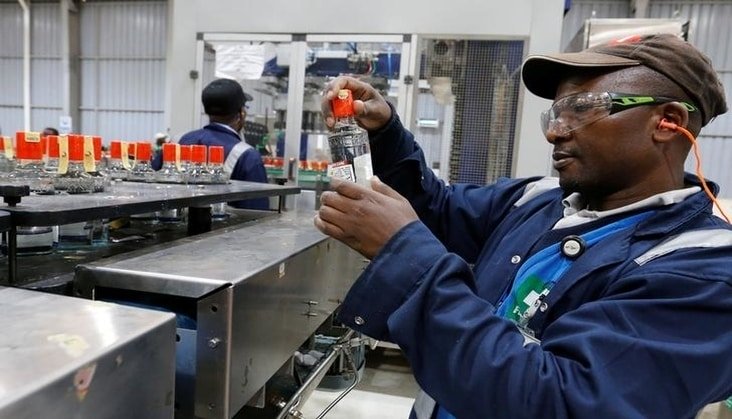An employee inspects a bottle of Kenya Cane spirit at an East African Breweries factory in Nairobi in 2018. REUTERS/Thomas Mukoya Kenya’s drinking culture is being redefined due to the COVID-19 pandemic, East African Breweries Chief Financial Officer Risper Ohaga tells The Africa Report.
The country’s President Uhuru Kenyatta has singled out young people going out and drinking alcohol as a factor that has caused the virus to spread. Sales of alcohol in restaurants are currently banned and any business that does sell alcohol can only do so until 7:30 p.m.
After steep initial declines in March and April, overall sales in Kenya had bottomed out by June , says Ohaga, who joined East African Breweries (EAB) from Barclays Africa in February. But “customer behaviour will not bounce back soon and neither will their pockets.”
READ MORE Ramaphosa’s abrupt booze ban puts 1 million jobs at risk, says industry
Outside Kenya, EAB’s markets are in Uganda, Tanzania, Rwanda and South Sudan. Despite falling beer sales, EAB has been able to sustain growth in spirits sales in all its markets. In Kenya, she says, this is due to the fact that beer is usually consumed in public and is less likely to be taken home. “Spirits are more portable.”
The article continues below Free download
Get your free PDF: Top 500 african companies 2019
Your guide to Africa’s leading corporates
Complete the form for your free download of The Africa Report’s 2019 Exclusive Ranking of Africa’s top 500 companies from last year. Get your free PDF by completing the following form.
Country *
Industry * Excise duties in Kenya were a constraint on beer sales that predated COVID-19. Ohaga would like to see them reduced. The duties are inflation-linked , which mean that the cost to the consumer rises every year. Yet workers do not always get pay rises in line with inflation , she says. Two-thirds of the cost of a regular Kenyan beer is excise duty, she says, while noting that there are some concessions from the government on low-cost value beers, such as EAB’s Senator Keg. Duties on spirits are lower. The government has focused on beer as consumption is more widespread and generates more revenue than spirits, she notes. That raises the prospect of greater segmentation of the Kenyan market, with more people either trading down to cheaper beers or trading up to spirits. Earnings Outlook Clouded EAB is the region’s largest beer […]
